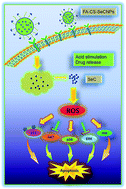Rational design and fabrication of a cancer-targeted chitosan nanocarrier to enhance selective cellular uptake and anticancer efficacy of selenocystine†
Abstract
The rational design and fabrication of nanodelivery systems to encapsulate drugs has been proven to be a promising and effective strategy for cancer therapy. Selenocystine (SeC), a naturally occurring selenoamino acid, has received more and more attention due to its novel pharmacological properties in the treatments of cancers. In this study, we fabricated a cancer-targeted nanodrug delivery system by encapsulating SeC into chitosan (CS) nanoparticles with folate surface decoration (FA–SeC–CSNPs) and evaluated its antiproliferative activities. The nanosystem entered the cells through endocytosis and released SeC in lysosomes under an acidic environment. Compared with SeC–CSNPs and SeC, FA–SeC–CSNPs significantly inhibited the growth of HeLa human cervical cancer cells that overexpressed folate receptors through the induction of apoptosis with the involvement of PARP cleavage and caspase activation. Moreover, FA–SeC–CSNPs also significantly suppressed the migration and invasion of HeLa cells in a dose-dependent manner. Furthermore, the intracellular nanosystem triggered the overproduction of reactive oxygen species (ROS) as early as 25 min after treatment, which activated various downstream signaling pathways such as p53, AKT and MAPKs to induce the cell death. Taken together, this study demonstrates a strategy for rational design of a cancer-targeted nanosystem loaded with selenocompounds to achieve selective cellular uptake and enhanced anticancer efficacy.


 Please wait while we load your content...
Please wait while we load your content...